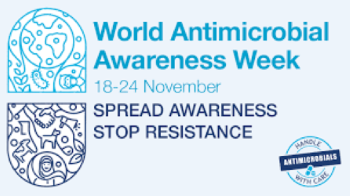-
Say we may be heading towards pre-antibiotic era
Experts, once again decried the rate of resistance by infection-causing germs to antibiotics, as the world marked the 2021 World Antimicrobial Awareness Week (WAAW), saying the country and the world at large may be heading towards the pre-antibiotic era when infections and wounds killed freely without effective treatments and cure.
Speaking at a virtual media dialogue with experts and stakeholders organized by St. Racheals Pharma on Friday, November 19, the experts agreed that both government, medical practitioners and the general public must make concerted effort to preserve the few antibiotics currently in the market to ensure their continued effectiveness, as no new ones are currently being introduced.
In her presentation, Dr. Esohe Ogboghodo, a Public Health Physician and Head. Department of Public Health and Community Medicine, University of Benin Teaching Hospital (UBTH) traced the causes of antibiotics resistance to factors which include unrestricted access by members of the public to antibiotics, which often result in abuse.
“Unrestricted access to antimicrobials over the counter from pharmacies, under-regulated patent medicine vendors and hawkers may be the biggest driver of resistance in Nigeria. These stores often sell drugs that are outside the list of medicines approved for them. In addition, there are also several itinerant drug sellers that go about hawking unapproved and often poor quality medicines to the public including antimicrobial agents.
“The ease of access and overuse of antimicrobials have resulted in an increasing resistance of bacteria to antibiotics, which is paradoxically leading to a loss of effectiveness.”
Dr Ogboghodo who is also the Chairman, UBTH’s Infection Prevention and Control disclosed that antibiotics are being over-prescribed by health workers, sometimes as a result of patient’s demand, while they are also being over-used by the public.
“Poor adherence to antibiotics prescription by individuals have also been implicated. Factors contributing to poor adherence to antimicrobial treatment include financial incapability to purchase full dose, long duration of treatment and side effects experienced.
“Furthermore, the unfinished doses of antimicrobials are usually kept for future use, or given to other persons with similar complaints,” she further said.
Another panelist, Dr. Bamidele Mutiu, a Consultant Clinical Microbiologist at the Lagos State College of Medicine and Lagos State University Teaching Hospital also blamed health practitioners for contributing to antibiotic resistance situation in Nigeria.
According to him, some doctors prescribe drugs without proper investigation to ensure whether or not antibiotics are required. Thus, he said, the theme of this year’s WAAW – “Spread Awareness, Stop Resistance” should start with health practitioners.
“Every time we come in contact with patients, within and outside the hospital, we should tell them ‘you don’t need antibiotics’ unless it is indicated, backed up by laboratory diagnosis, microbiological evidence and sensitivity testing. I can tell you we, the health workers, are also guilty.
“For some of us, every patient they see, they are adding antibiotics (to their prescriptions) to increase the amount they (patients) will pay and increase profit. We should look inward because we the health workers, have a role to play’’
The Managing Director of St. Racheal’s Pharma, Mr. Akinjide Adeosun, in his contribution, traced the problem of antibiotic resistance in Nigeria to the country’s high out-of-pocket healthcare expenditure.
According to him, the pressure on patients to pay often leads to sub-optimal purchase of antimicrobial doses thereby encouraging microbials to be resistant to available drugs.
“I hereby state my unequivocal support to the House of Representatives’ bill championed by Hon. Bello Kaoje to make children’s healthcare services free. This will revolutionize care for Children in Nigeria. This bill has passed the second reading and must be supported by everyone.
“If parents don’t have to worry about out of pocket expenditure, this will directly translate into full dispensing of antimicrobials thereby enhancing eradication of microbes and leading to reduction of antimicrobial resistance,” he stressed.
Dr. Ogboghodo highlighted the consequences of antibiotic resistance which she described as a major public health problem. According to her, such resistance reduces the doctor’s choices of treatment, limiting specific antibiotics suitable for that infection. Thus, the physician is forced to choose an antibiotic which may be expensive or perhaps more toxic and potentially moderate pharmacokinetics for a particular infection.
“It increases mortality. Many nosocomial (hospital acquired) infections are already caused by bacteria resistance to all known antibiotics and many researchers believe that we will return to the pre-antibiotic period.
“It increases human pain, infections become refractory, and the patient remains in hospital longer than they would have or are forced into the hospital, because it is necessary to use intravenous therapy.
“The occurrence of resistance in hospitals is considered an indicator of poor quality care services’’ she said.
The experts therefore stressed the need for a rational use of the antibiotics currently circulating in the country as a way of preserving them and reduce the growing antibiotic resistance in the country and the world at large.
Dr. Ogboghodo urged doctors to prescribe “only in defined indications,” adding that the use of broad-spectrum antibiotics should be minimized and they should be used for the shortest duration possible.
“Shorter courses also improve patient’s compliance which gives an added benefit. Revision empiric antibiotic regimens on the basis of patient progress and, if needed, perform culture results.
“Avoid prescribing antibiotics based on non-evidence-based historical practices, patient demand, convenience, or pressure from colleagues, to delay appointment, or to retain the patient.
“A didactic discussion with the patient is indispensable to change the over-prescribing phenomenon. Healthcare providers must ensure patients understand, and are supported in adhering to, the planned duration of therapy, she further urged.



